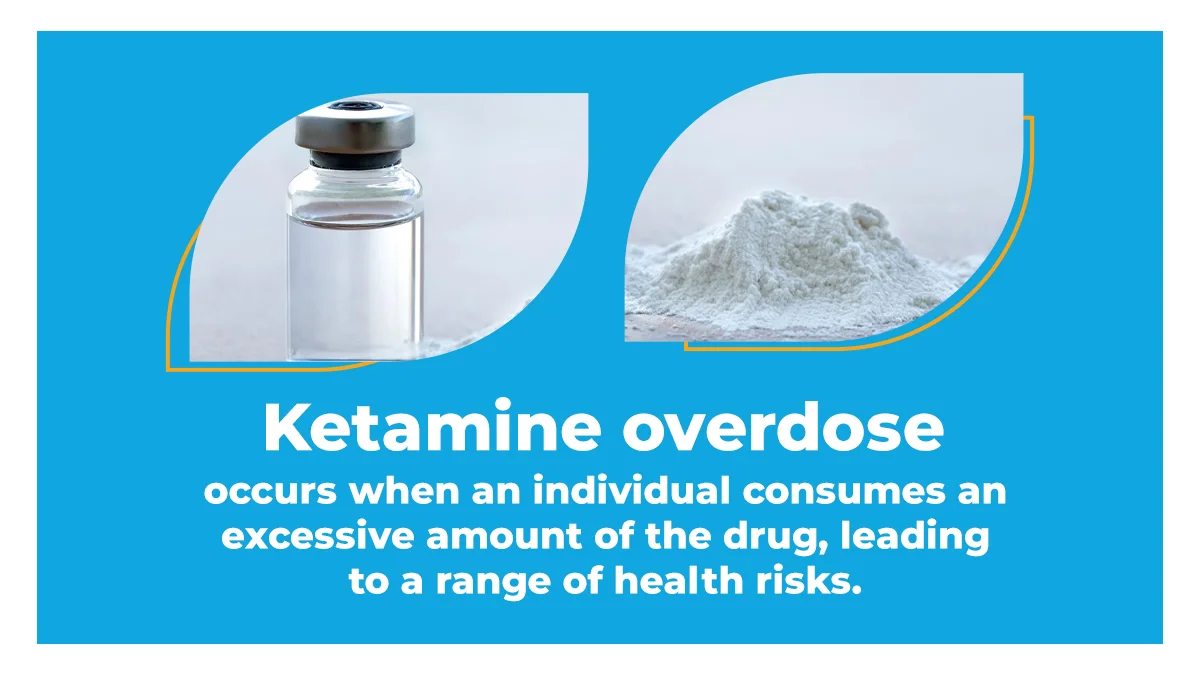Ketamine Overdose: A Look at Signs and Symptoms
Ketamine overdose occurs when an individual ingests an excessive amount of the drug, a dissociative anesthetic commonly used in medical and veterinary settings. In such cases, the body and mind are subjected to an overwhelming dose of the substance, leading to a range of adverse health effects.
Excessive ketamine intake manifests through a range of physical and psychological symptoms. This article will dig into the detailed exploration of these overdose symptoms. Recognizing these signs is essential for seeking timely medical assistance and preventing further health complications.
Key Takeaways
Ketamine is a potent anesthetic with medical uses but holds the potential for misuse. Here is what you need to know:
- Ketamine overdose occurs when excessive consumption surpasses the body’s safe processing limits.
- Overdosing on ketamine manifests through various signs and leads to a range of health consequences.
- In case of a suspected overdose, it is crucial to take emergency steps immediately, starting with calling 911.
For those dealing with substance use disorders (SUDs), The Recovery Team offers comprehensive addiction treatment services. Contact us at (800) 817-1247 for details.
What is Ketamine Overdose
Ketamine, a dissociative anesthetic drug approved by the United States Food and Drug Administration (FDA), is commonly used in veterinary medicine and human anesthesia. In medical settings, it is often employed for inducing and maintaining anesthesia, especially when a rapid onset and short duration of action are desirable.
Ketamine is also used off-label for chronic pain management. In recent years, it has gained attention for its potential therapeutic effects in mental health conditions like treatment-resistant depression (TRD), anxiety disorders, post-traumatic stress disorder (PTSD), bipolar disorder, and others.
However, outside of its legitimate medical uses, ketamine is sometimes abused for recreational purposes for its hallucinogenic and dissociative effects. This can lead to various health risks, including the potential for overdose. Ketamine overdose occurs when an individual takes higher doses of ketamine than their body can safely process, leading to potentially serious health consequences.
Symptoms of a ketamine overdose can vary from one person to another, and the severity depends on different factors, such as the individual’s tolerance, the amount of ketamine ingested, and whether it’s taken in combination with other substances, such as alcohol.
The treatment of ketamine overdose involves supportive care and symptom management. Medical practitioners may administer benzodiazepines to manage agitation and seizures. Treatment options for ketamine addiction include detoxification, behavioral therapies like cognitive-behavioral therapy (CBT), and support groups to manage withdrawal symptoms and cravings.
Identifying Ketamine Overdose: Signs and Symptoms
Ketamine overdose can manifest with both physical and psychological symptoms. Here’s a breakdown of the symptoms associated with an overdose of this dissociative drug:
Physical Symptoms of Ketamine Overdose
Ketamine overdose presents a range of physical symptoms, including:
- Respiratory Depression: Slow or shallow breathing is a clear sign of ketamine toxicity. This can lead to a lack of oxygen in the body, potentially resulting in serious complications.
- Cardiovascular Effects: Increased heart rate and elevated blood pressure may occur during a ketamine overdose. In severe cases, this can lead to cardiovascular issues.
- Impaired Motor Function: Ketamine can cause significant impairment of motor skills, leading to difficulty moving or a sense of immobility.
- Nausea and Vomiting: Gastrointestinal symptoms, such as nausea and vomiting, are common physical reactions to ketamine overdose.
- Blurred Vision: Ketamine can affect vision, leading to blurred vision or abnormal eye movements.
- Seizures: In some instances, seizures may occur as a result of ketamine overdose, representing a serious medical emergency.
Psychological Signs of a Ketamine Overdose
The following symptoms mark the psychological impact of a ketamine overdose:
- Confusion and Disorientation: Ketamine can induce a state of confusion, making it difficult for individuals to understand their surroundings or communicate effectively.
- Hallucinations: Overdose may intensify the hallucinogenic effects of ketamine, leading to vivid and potentially disturbing hallucinations or altered perceptions of reality.
- Delirium: A state of delirium, marked by extreme confusion, disorientation, and impaired cognitive function, may occur during a ketamine overdose.
- Anxiety and Panic Attacks: Overdose may contribute to heightened anxiety or induce panic attacks.
- Psychosis: In severe cases, ketamine overdose can induce psychotic symptoms, including paranoia, delusions, and a loss of touch with reality.
- Dissociation: Ketamine is known for its dissociative effects, and an overdose may intensify these experiences, leading to a sense of detachment from oneself or one’s surroundings (known as “k-hole).
Remember, these symptoms can be dangerous, and if someone is at a higher risk of overdose, immediate medical care is essential.
Ketamine Overdose Fallout: Short and Long-Term Risks
Ketamine, a prescription medication, poses significant health risks when misused, especially in cases of overdose. Here is the breakdown of common effects associated with ketamine toxicity:
Short-Term Health Implications
In the short term, ketamine overdose can lead to a range of immediate negative side effects. Physically, individuals may face high blood pressure and fast heart rate, putting strain on the cardiovascular system. Respiratory distress is a pressing issue, as slowed or labored breathing can lead to oxygen deprivation, posing serious risks.
Coordination impairment is another short-term consequence, making everyday activities challenging and increasing the likelihood of accidents and severe injuries. In addition, the intense hallucinations and altered perceptions experienced during a ketamine overdose can contribute to confusion and disorientation, creating a dangerous situation for the individual.
Long-Term Health Implications
Regular use of ketamine can give rise to long-term health concerns. Chronic use may lead to damage to the urinary tract, with conditions such as ketamine bladder syndrome causing inflammation and pain during urination. Cardiac conditions and respiratory complications may also arise as a result of overdose.
Psychologically, individuals may experience persistent anxiety, paranoia, and cognitive impairment, impacting their overall mental well-being. Long-term ketamine use is also associated with the development of tolerance, requiring high doses of the drug to achieve the same effects, leading to a greater risk of the onset of ketamine use disorder.
Ketamine Overdose Treatment
Ketamine overdose can be life-threatening, and prompt intervention is essential. Here are some general emergency steps that might be taken:
Call Emergency Services
The first and immediate action in a ketamine overdose situation is to call 911. Emergency medical professionals are trained to handle overdose cases, and prompt intervention can be life-saving. Provide clear and concise information about the situation, emphasizing the suspected ketamine overdose.
Stay Calm and Monitor Vital Signs
While waiting for emergency services, stay calm and monitor the person’s vital signs. Check their breathing, pulse, and responsiveness. If they stop breathing or lose consciousness, be prepared to perform CPR if you are trained to do so.
Keep the Person Awake and Alert
Try to keep the individual awake and alert. Engage with them verbally and encourage them to stay conscious. However, avoid giving them food or fluids, which may worsen the situation.
Do Not Leave Unattended
Stay with the individual until medical professionals arrive. Please do not leave them unattended, as the situation can change rapidly, and immediate action may be required. Your presence can also provide reassurance and assistance to emergency responders.
Share Information with Medical Professionals
Upon the arrival of medical professionals, share any relevant information about the circumstances leading to the overdose. Be honest and provide details about the quantity of ketamine consumed and any other substances involved. This information is crucial for accurate diagnosis and treatment.
Understanding these emergency steps is essential for anyone who may encounter a ketamine overdose situation. By acting swiftly and responsibly, individuals can contribute to the well-being of those in need.
The Recovery Team: Your Path to Renewal
Embark on a journey toward healing and freedom from ketamine addiction. At The Recovery Team, we understand the challenges you’re facing, and we’re here to guide you towards a drug-free, better life.
Our dedicated team of experts offers comprehensive care options tailored to your needs, combining evidence-based therapies (individual and group sessions), expert medication management, dual diagnosis programs, and other holistic approaches.
Don’t let drug use disorder dictate your life anymore. Take the first step today by contacting us at (800) 817-1247. Let us be your guide toward a path of recovery and renewal.






